牛津译林版 模块三 Module 3 unit 3 Revision (共11张PPT)
牛津译林版 模块三Unit3 project (共13张PPT)
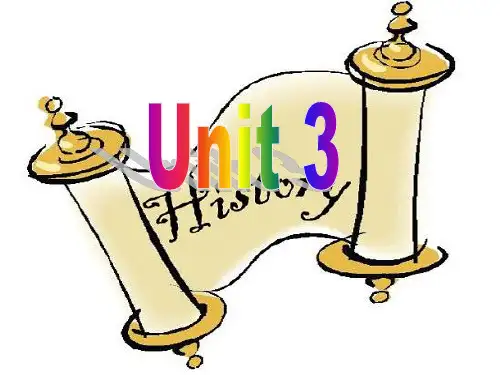
_R_e_a__so_n__s_for Socrates’ death
Then read the passage again carefully and ask questions about the passage. (Each team asks 1 question, and write it on the paper.)
Socrates (苏格拉底) ['sɔkrəti:z]
A classical Greek Athenian Philosopher
The father of Western philosophy
Now listen to the passage and get the main idea of each paragraph.
we do to better our education reform?
Writing(homework)
• “My opinions on the Socratic Method” Or
• “My advice on the education reform in our class.”
成功是一种观念,成功是一种思想,成功是一种习惯,成功是一种心态。 目标不是都能达到的,但它可以作为瞄准点。 世界上只有想不通的人,没有走不通的路。 过错是暂时的遗憾,而错过则是永远的遗憾! 要生活得漂亮,需要付出极大忍耐。一不抱怨,二不解释。 成功是一种观念,成功是一种思想,成功是一种习惯,成功是一种心态。 就算学习和生活再艰难,也要一边痛着,一边笑着,给生活一张漂亮的脸。 用自己的双手去创造生活,用辛勤的汗水实现人生的梦想。 假如你从来未曾害怕受窘受伤害,那就是你从来没有冒过险。 被朋友伤害了和被陌生人伤了其实是一样的,别怀疑友情,人家不欠你的,但要提防背叛你的人。 泉水,奋斗之路越曲折,心灵越纯洁。 只要你在路上,就不要放弃前进的勇气,走走停停的生活会一直继续。 最孤独的时光,会塑造最坚强的自己。 对自己不满是任何真正有才能的人的根本特征之一。 明天是世上增值最快的一块土地,因它充满了希望。 年轻是我们唯一拥有权利去编织梦想的时光。 有志者自有千方百计,无志者只感千难万难。 生活就像海洋,只有意志将强的人才能到达彼岸。
牛津译林版模块三 revision(共30张PPT)
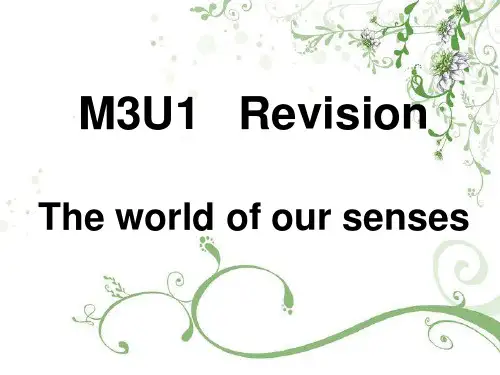
2. Important words
2)approach (Translation)
①It gets colder approaching.
and天c气ol变de得r,越wi来nt越er冷is,冬天 快要来临了。
②(朗文P84)Researchers are looking for new
ways to approach the problem.
Step1: Words
10. 缺陷,伤残 n. disability adj. disabled 11. 轻松,宽慰 n.relief vt. relieve 12. 焦虑的,忧虑的 adj. anxious n. anxiety 13. 认识,辨认出;承认认可vt. recognize n.recognition 14. 犹豫vt. hesitate n. hesitation 15. attract 吸引 n. attraction adj. attractive 旅游景点tourist attraction 16. 用confuse 相关形式填空
attachment 7. adj. 相反的 n. 相反的事实或情况 contrary 8. adj. 松动的,松开的;宽松的 vt. 松开,释放 loose 9. employ(英译汉) 雇佣,使用
Step1: Words
10. 缺陷,伤残 n._________ adj.________ 11. 轻松,宽慰 n._________ v.__________ 12. 焦虑的,忧虑的 adj._______ n._______ 13. 认识,辨认出;承认,认可vt.________ n._________ 14. 犹豫vt. ___________ n.___________ 15. attract 吸引 n. ___________ adj.____________
译林英语必修3Unit3 Revision(共18张PPT)
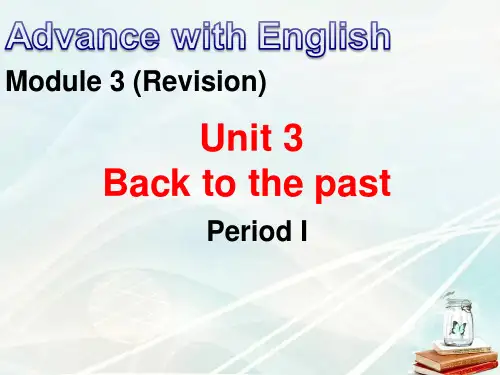
___to__d_8i_g_____ (dig) carefully and ___t_o__b9r_u_s__h__ (brush) away the dirt. You must _____re_1c0o_r_d____ (record)
Step 2 A competition
Who can tell more words quickly and correctly with the books closed?
Chinese
v.
n.
adj.
adv.
meaning
历史
history historic(ahl)istorically
Finish the exercises on Page 65 of your books.
Step 5 Writing 作为四大文明古国之一,无数世界各
地的人们来到中国感受古文明给我们留下 的宝贵遗产。假如你是李华,你的笔友 Jack也想要了解更多的中国历史,请你写 一封回信向他介绍一处历史遗址、一位历 史名人或者一次重大历史事件。 注意:100词左右; 适当运用以上所学短语、句式以及三大从 句、强调句、倒装句、非谓语动词等。
课文再现
Today I saw the ancient Roman
city of Pompeii as it was 2,000
years ago.
(Line 14)
When I walked around the city, I
saw streets just as they had
been, ...
译林英语必修3Unit3 Revision (共21张PPT)
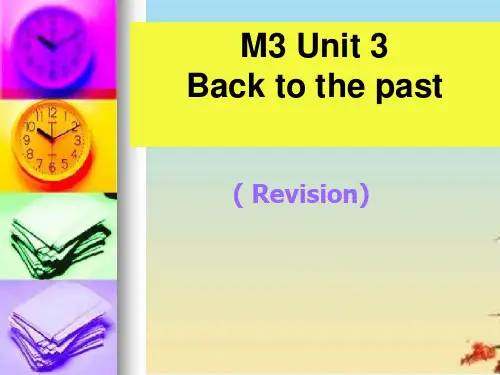
2.Unfortunately, all the people were buried alive, and so was the city. bury 埋;埋葬
• After the battle they buried the dead.
书本与学生对话(导学探疑)
Deal with the exercises and summarize the usages of the
phrases.
学生与学生对话
Discussion and presentation (group work)
Group 1: take over Group 2: with复合结构 Group 3: turn out Group 4: remain Group 5: stop sb. from doing
• take back
收回
• take down 拿下,放下;写下,记下
• take in
接纳,吸收;欺骗
• take off
取下,脱掉(衣服等);起飞
• take on
接受;雇佣; 呈现,露出
• take out
取出;
• take up (teaching) 从事;学习
take up too much time/ space 占用
引学释疑
Presentation
学生与老师对话(固学思疑)
Summary and consolidation
1. take over 夺取, 接管
The army has taken over the party. The firm has been taken over by a large company. When he retired , his son took over the business from him.
牛津译林版 模块三Unit3 project(共27张PPT)

3.Evaluation / Famous saying/Influence
Liu Xiang
Date of birth: July 13th, 1983 Place of birth: Shanghai, China Appearance: Handsome Talents: Good at running and jumping
Alexander (356BC-323BC)
ambitious brave fearless mighty great
Socrates (469-399BC)
The father of Western philosophy
If you have a chance to write a report about Socrates, what will be included ?
Fast-reading
(Look at the first and the last sentences of each paragraph and try to match each paragraph with its main idea.)
Paragraph 1 Paragraph 2 Paragraph 3 Paragraph 4
Welcome!
Unit 3 Project
Making a poster about a historical figure
Ancient Greek statue found in Xinjiang
Answer the following questions:
1.Where was the statue discovered in Xinjiang probably from?
牛津译林版模块三 revision精品课件
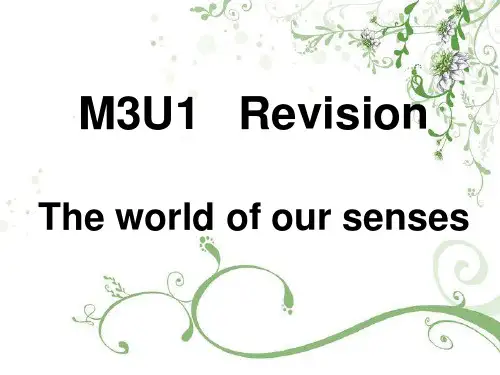
2).The driver ignoredthe traffic lights and had an accident.
M3U1 Revision
The world of our senses
Learning aims: 1) At the end of this class, you will review some important words, phrases and sentences. 2) You will have a better understanding of the usage of 2 words and 3 sentences. 3)You need to use these freely to write a short story according to the pictures.
Students are confused with the confusing situation.
There is a confusion about what the students should do to solve the problem.
牛 津 译 林 版 模块三 r evis ion精品 课件
Step1: Words
1. Check the following words.
1.预测 vt/n.________ 2. 抓紧;抓牢vt. _________ 3. 牢牢地,坚定地adv. _______ 4. 分析vt.__________ n.__________ 5. ignore(英译汉) vt.________ n.___________ 6. attach (英译汉)vt. _________ n._________ 7. adj. 相反的 n. 相反的事实或情况__________ 8. adj. 松动的,松开的;宽松的 vt. 松开,释放
精选高中牛津 Module 3 unit 3 Revision公开PPT课件
e down with患__…__病
13.起义反抗_r_i_s_e_u__p__a_g__a_i_nst
14.做为…而出名_b__e__k_n__o_w__n__a_s
15.专心于…__b_e__b_u__r_ie_d__i_n_/_b_e__lo_s_t__in__/b__u_r_y__o_n_e_s_e_l_f_i_n_/_lose
------Written by Wei Tingting(our classmate)
Step 6 Homework
Further review all the language items in this unit after class.
Good staying with you!
Thank you for your cooperation!
5.take up__占__领_
6.状态好_i_n__g_o_o__d__c_o_n_ dition 7.为…纪念_i_n__m__e_m__o__r_y_ of
8.result in__导__致
10.涌入p__o_u__r__in__t_o
9.意识到 _b_e__a_w__a_r__e of
11.取得…的资格_w__in__a__p_l_ace in
simply way. (decoration)
3.President Xi took part in the m__e_m__o_r_i_a_l ceremony
in Nanjing on December 13, 2014. (memory)
4._J_u_d_g_i_n_g_ by all the traffic, we are probably in the
牛津译林版 模块三Unit3 Project (共17张PPT)
Alexander’s victories and d eath
.
Alexander the Great’s influenceon the world
When sword meets words, which speaks louder?
…
In Greece, before Alexander, there was also a great fighter, who, instead of fighting with a sword,
of life .
Brief
• He came from Athens, Greece and lived to
introductions the age of 70 .
to Socrates • He once worked as a soldier, a teacher and
a worker.
Para.1 Para.2 Para.3 Para.4
the definition/ meaning of philosophy brief introduction to Socrates Socratic Method reasons for Socrates’ death
The meaning Philosophy is a way of looking at the world of philosophy around us, or of answering the great questions
ancient Greek statue.
பைடு நூலகம்
Scanning
Para.1
Para. 2 Para. 3 Para. 4
the discoveryof a statue showing a result of Alexander the Great’s influence.
高中译林牛津英语模块三Unit3教案(优选.)
最新文件---------------- 仅供参考--------------------已改成-----------word文本 --------------------- 方便更改Module3 Unit3教学设计课题 AWE M3 U3 主备人杨凡课时主备教案课型 Welcome + Word powerLearning objectives:By the end of this period, students will be able to1. talk about some magnificent ancient civilizations;2. practice their spoken English and participate in all the designed activities;3. develop their sense of culture protection;4. enlarge their vocabulary by learning some words about archaeology and other subject. Focus of the lesson:1. picture-talking2. finishing the tasks and having group competitionsPredicted area of difficulties:1. expressing their opinions about ancient civilizations2. memorizing words and phrases concerning civilizations and archaeologyLearning aids:1. PPT2. blackboardLearning procedures:Reading (1)Learning objectives:By the end of this period, students will be able to1. grasp the main idea of the text;2. develop the ability of reading diary entries;3. talk about the topic of civilization in English. Focus of the lesson:1. having a thorough understanding of the article2. putting reading strategy into practical use Predicted area of difficultiesunderstanding the general idea of the article Learning aids:1. PPT2. blackboardLearning procedures:课型 Reading (2)Learning objectives:By the end of this period, students will be able to1. grasp the usage of some key words and phrases;2. understand the diary entries better;3. use the key words and phrases correctly in relevant exercises. Focus of the lesson:the usage of some key words and phrasesPredicted area of difficultiesthe usage of the words and expressionsLearning aids:1. PPT2. blackboardLearning procedures:课型Grammar and usageLearning objectives:By the end of this period, students will be able to1. grasp the rules of subject-verb agreement and the object complement;2. u se the compound sentences introduced by neither…nor…, either…or…, not only…but also…;3. develop their ability of using the grammar rules to make correct sentences.Focus of the lesson:1. grasping the rules of object complement2. knowing clearly the rules of Subject-verb agreementPredicted area of difficultiesknowing clearly the rules of Subject-verb agreementLearning aids:1. PPT2. blackboardLearning procedures:课型____TaskLearning objectives:By the end of this period, students will be able to1. enhance their overall abilities and improve their skills of listening, writing and talking;2. learn how to write an outline of a speech and how to host a talk about a historical event;3. choose and organize the information they have got and complete their products.Focus of the lesson:1. preparing for a talk.2. learning how to write an outline of a speech3. learning how to host a talk about a historical eventPredicted area of difficultiescombining the skills they have learned with realityLearning aids:1. PPT2. blackboardLearning procedures:课型____ProjectLearning objectives:By the end of this period, students will be able to1. read and understand the text;2. get to know how to introduce someone important in history;3. learn how to make a good poster.Focus of the lesson:1. understanding the main idea of the two articles2. learning how to make a poster about a historical figure Predicted area of difficultiesmaking a poster about a historical figureLearning aids:1. PPT2. blackboardLearning procedures:最新文件---------------- 仅供参考--------------------已改成-----------word文本 --------------------- 方便更改赠人玫瑰,手留余香。
牛津译林版Module 3 Unit 3 Project(共18张PPT)
• Death
399 BC
Read for details:
Para 3: the Socratic Method
1. How did Socrates teach his students?
By asking questions.
2. What’s the purpose of asking them questions?
passage?
356 BC 336 BC
(20)
334 BC
326 BC (30) 323 BC
What do you know Alexander the Great?
was born, the son of ...who defeated...
become king, rose up against, led an army (3,000 troops), take back, won, enemy soldiers joined
Read for details:
Para 2-3: Information about Alexander the Great
• 1.How long did Alexander the Great live?
He lived for 33years. (356-323 BC)
• 2.which important years are mentioned in this
The statue is strong envidence of the great expedition(远征) of Alexander the Great. 2. What great influence does Alexander the Great have on the world? 1) spread the Greek culture
- 1、下载文档前请自行甄别文档内容的完整性,平台不提供额外的编辑、内容补充、找答案等附加服务。
- 2、"仅部分预览"的文档,不可在线预览部分如存在完整性等问题,可反馈申请退款(可完整预览的文档不适用该条件!)。
- 3、如文档侵犯您的权益,请联系客服反馈,我们会尽快为您处理(人工客服工作时间:9:00-18:30)。
Module 3 unit 3 Back to the past
Revision
Step 1 Lead-in
Have the student on duty retell ‘Reading’
Step 2 Language items
1.He has received a good e_d__u_c_a_t_io__n, in other words , he is well _e_d__u_c_a_t_e_d_. (educate) 2.I decided to have my new house d__e_c_o_r_a_t_ed in a
5.我已受够了他。他总是随地吐痰。
I _h_a_v_e_h_a_d__e_n_o_u_g_h__o_f_ him! He always spits everywhere.
6.曾经有条河流贯穿市中心。
There used to be a river _ru__n_n_in_g__t_h_r_o_u_g_h_ the middle of the city.
downtown area. (judge)
5.Your beliefs are veryp_o__w_e_r_f_u_l_and have the p__o_w_e_r
to create and destroy life. (power)
6.Ther_e_m__i_a_n_sof the temple can be seen now.(remain)
Part 1 key words
1.遗物__r_e__m___a_i_n_ s 2.废墟/毁坏__r_u__i_n_ 3.商业的_c_o_m___m__e_r_c_i_a_l 4.宣称_d_e_c_l_a_r_e_ 5.beneath_在__…_下__面_ 6.ceremony_仪__式_,_典__礼_; 7.civilize(v.)_c_i_v_il_i_z_a_ti_o_n_(n) 8.wealth(n.)_w__e_a_l_th__y_(adj.) 9.wood(n.)w__o_o_d_e_n_(adj.) 10.decorate(v.)d__e_c_o_r_a_t_io__n_(n.) 11.flee(v.)_f_le_d___(p.p); 12.solve(v.)_s_o_l_u_t_io__n (n.) 13.power(n.)_p_o_w__e_r_fu__l(adj.); 14.aware(adj.)__a_w__a_r_e_n_e_s_s_ (n.)
e down with患__…__病
13.起义反抗_r_i_s_e_u__p__a_g__a_i_nst
14.做为…而出名_b__e__k_n__o_w__n__a_s
15.专心于…__b_e__b_u__r_ie_d__i_n_/_b_e__lo_s_t__in__/b__u_r_y__o_n_e_s_e_l_f_i_n_/_lose
oneself in/apply oneself to
Part 3 Important sentence patterns plete inversion(完全倒装)表地点/方位的介词短语++助动词/be/情态动词+sb/sth
2.某人某事也是这样。So +助动词/be/情态动词+sb/sth
15. explode(v.)__e_x_p_l_o_s_io_n___ (n.)
Part 2 Important phrases
1.接管__t_a_k__e_o__v_e_r
2.break down出__故__障__
3.经历_g_o__t_h__r_o_u__gh
4.阻碍_s_t_a__n_d__i_n__o_n__e_’_s_path
simply way. (decoration)
3.President Xi took part in the m__e_m__o_r_i_a_l ceremony
in Nanjing on December 13, 2014. (memory)
4._J_u_d_g_i_n_g_ by all the traffic, we are probably in the
5.take up__占__领_
6.状态好_i_n__g_o_o__d__c_o_n_ dition 7.为…纪念_i_n__m__e_m__o__r_y_ of
8.result in__导__致
10.涌入p__o_u__r__in__t_o
9.意识到 _b_e__a_w__a_r__e of
11.取得…的资格_w__in__a__p_l_ace in
B . Complete the following sentences
1.老爸退休后,儿子会接任来管理公司。
The sonw__il_l _ta_k_e__o_v_e_r the company after his father retires.
2.这些天她在用一些装饰品装饰她的房子。
She h_a_s_b_e_e_n_d_e_c_o_r_a_t_in_gher room w__it_h_some decorations
recen. tly.
3.我们认为掌握一门外语很有必要。
We think__it_ necessary_t_o__m__a_s_te_r_ a foreign language.
4.当谈到足球时,他很健谈。
When it _c_o_m__e_s_t_o_football, he talks a lot.
3.据说……
It is with sb/sth ./ So it is the same with sb/sth It is said that…/ Sb/sth is said to do…
Step 3 Practice
A . Fill in the blanks with the word given , using another form or part of speech.
